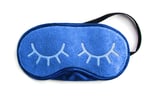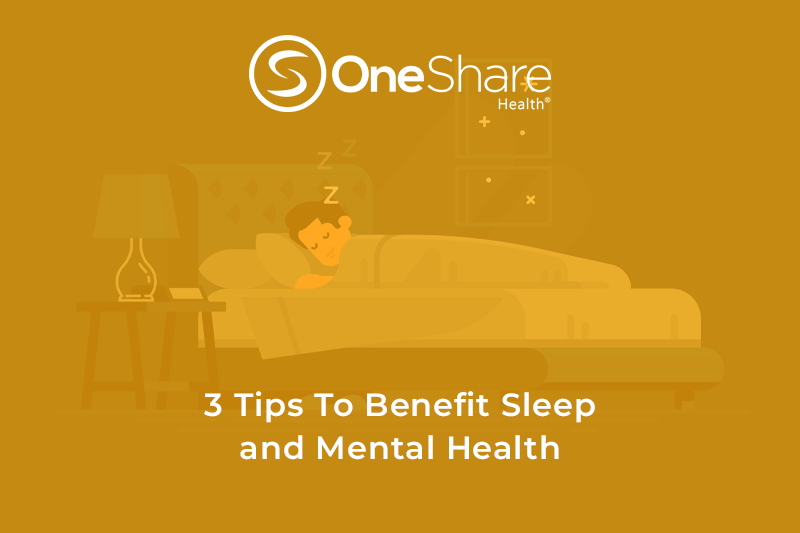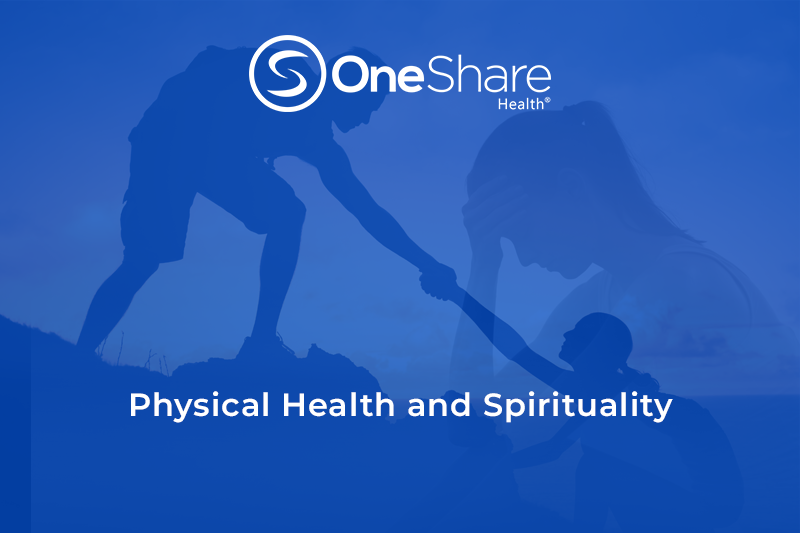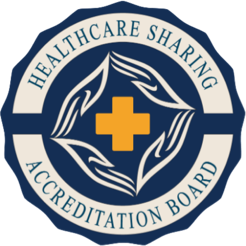Sleep and mental health are two of the most critical factors in our overall wellness. While it can be a touchy subject for some, now more than ever it’s imperative to have open conversations about mental health. The benefits of sleep are endless, read on to learn tips on how to get better sleep to improve your mental health.

Save up to 50% or more on your family's health care! Input your ZIP Code below for a free OneShare Health quote!

Whether you’re a student heading back to school, a new parent expanding your family, a professional navigating the stresses of work, or anyone in between, there are several factors that can make a difference in your everyday sleep patterns and mental health.
1. Diet
In recent years, studies have shown that diet has a direct effect on sleep. This goes beyond coffee in the afternoon or a late-night sugary snack; the nutritional value of the food and beverages consumed throughout the day also plays an essential role in how well you are able to sleep at night.
 Caffeine
Caffeine
It may seem obvious that the coffee we rely on to keep us awake makes it harder to sleep. However, while it is widely known that caffeine is a stimulant, studies have determined the impact it has on our overall circadian rhythm or internal body clock. According to a study done by the Journal of Clinical Sleep Medicine, consuming caffeine 6 hours before going to bed reduces your sleep time by over an hour. In order to improve your sleep work on reducing your caffeine intake. The effects of caffeine can be extended throughout the day, including an elevated heart rate, restlessness, or frequent use of the bathroom. All of these effects can impact when you fall asleep and how soundly you sleep, making it a good idea to avoid caffeine 6+ hours before bedtime.
Sugar and Fat
As previously mentioned, the nutritional value of the foods consumed throughout the day impacts how well we sleep at night. To break it down, sugar is a simple carbohydrate that suppresses the neurotransmitter responsible for alertness, known as orexin. While sugar may cause drowsiness, it also causes our brains to work even harder trying to burn off the excess energy in the body. This results in poor sleep quality, either from frequent wake-ups or the lack of deep sleep. A 2016 study found the same results, concluding that saturated fat and sugar intake directly relates to the soundness of sleep.
2. Sleep Atmosphere
Your sleep environment is made up of multiple factors within your space, including noise, temperature, and light. If one or more of these factors are disrupted, it will have a direct impact on your sleep quality.
Noise
While sleeping or trying to fall asleep, the sounds around you impact how long and how well you rest. A noise that wakes you up causes a fragmented sleep, which is less refreshing and can cause irritability. For example, if you wake up to a loud noise in the middle of the night, your adrenaline and elevated heart rate can make it harder to fall back asleep. While you can’t avoid startling noises in the middle of the night, try to eliminate potential panic. Turn phone ringers off, set sleep timers on the TV, and allow yourself an uninterrupted night's rest.
Temperature
The temperature of your space is also a driving factor in how soundly you sleep. There’s no ‘ideal’ temperature since everyone has different preferences, but the best night’s sleep comes from whatever is the most comfortable for you. In extremely hot and cold temperatures, it is believed we are deprived of sound REM sleep. REM sleep, or rapid eye movement, is the sleep stage we associate the most with dreaming. Not only is REM sleep associated with dreams, but also relates to mood, learning, and memory. The lack of REM sleep can have a negative impact on these aspects, directly linking back to mental health.
Light
Another factor that influences our circadian rhythm is light. Since our internal clock works 24 hours a day, the light indicates when it is time to wake up and go to sleep. This is why your body defaults to staying awake during the day and sleeping at night; when cells on the retina sense light, the brain signals to the body that it’s time to wake up. If you find that the sun wakes you up too early in the morning, look into blackout curtains to allow you more time in the dark. This can extend your sleep schedule and give you a better night’s rest.
3. Eye Health
Many people fail to correlate the direct relationship between the health of your eyes and sleeping patterns. The truth is, if you are experiencing poor eye health then your sleep quality becomes drastically affected. Whether you are someone who has perfect vision or requires eyewear, it is essential that you always monitor your optical health.
Fatigue
Something that is all too common nowadays is overall tiredness in eye health. A lot of people tend to think that when you are over-tired that you will have no trouble falling asleep, but it can actually induce the opposite in many cases. Our bodies need between 7-9 hours of sleep each night, so when we fail to achieve that our bodies don’t function as normally. You may not notice it at first, but over time this schedule can drastically compromise your mental state and sleeping habits.
 Eyewear
Eyewear
Having the correct eyewear can also have a huge impact on your overall eye health. It’s imperative to remember to always keep your prescription updated if you are someone who wears contact lenses or glasses daily. Having a wrong or outdated prescription can cause your eyes to strain much more throughout the day, which not only leads to discomfort but damages your eyesight in the long run. If you are someone who frequently wears contacts, it is crucial to know the different types of contact lenses based on your personal needs. Whether you have a single or multifocal lens prescription, there are numerous options available to suit your preferences.
Sleep and mental health are often correlated, not to mention two of the most important factors when it comes to maintaining your personal wellness. If you find yourself struggling with either of these, remember to relax, take a deep breath, and organize your sleep and mental health habits. By improving and dedicating time to this aspect of your life you will notice a large and positive change in your well-being.

Save up to 50% or more on health care!
If you don't want to go the Obamacare route, and also want to save money on your care, check out our Health Care Sharing Ministry that's exempt from the ACA. OneShare Health is an alternative to traditional insurance coverage, we are a Health Care Sharing Ministry that could start saving you thousands per year on your healthcare!
Click below to learn more or get your free OneShare Health quote today.

Proverbs 11:25 (NIV)
“A generous person will prosper; whoever refreshes others will be refreshed.”






%20(1)-1.png)





